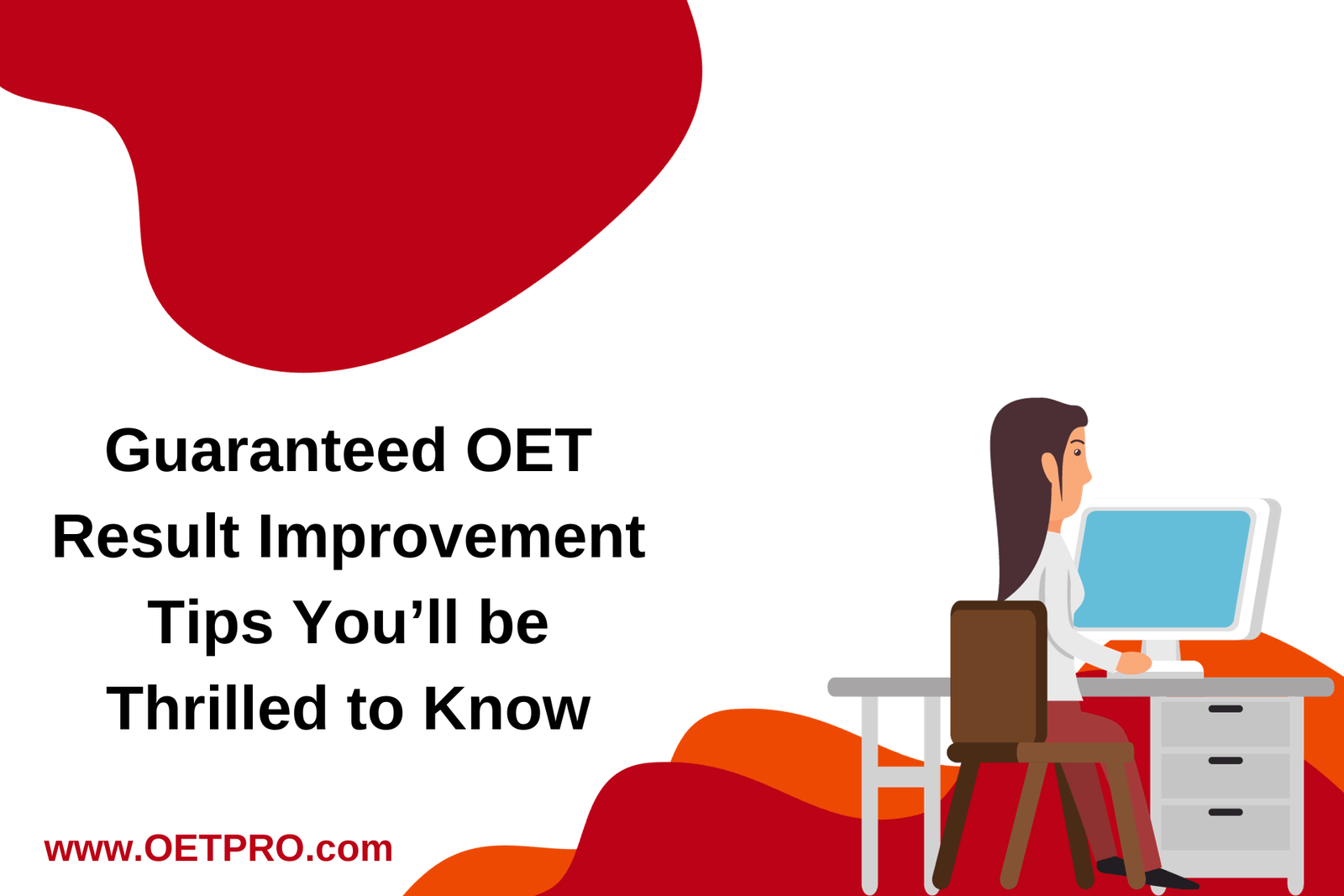
Guaranteed OET Result Improvement Tips You’ll be Thrilled to Know
The Occupational English Test (OET) is a challenging exam for healthcare professionals who want to work in an English-speaking country. It tests your ability to communicate effectively in medical situations, especially with patients and colleagues.
If you want practical and reliable tips to improve your OET results, this guide will help you prepare in the best way possible.
Understand the OET Test Format
Before you begin your preparation, it is important to understand the test structure.
The OET has four sections:
-
Listening
-
Reading
-
Writing
-
Speaking
Each section focuses on specific language skills required in healthcare settings.
Knowing the format helps you prepare strategically for each part.
Best Ways to Improve Your OET Results
Create a Study Plan
A structured study plan is essential for success.
Decide what to study and when.
Allocate time for every section, especially the areas you find difficult.
Consistency is the key to improvement.
Choose the Right Study Resources
High-quality materials make a huge difference.
Use reliable OET books, online courses, and practice tests.
Join study groups or OET forums for extra support and guidance.
Websites like www.oetpro.com offer helpful resources. You can even sign up for free practice.
Practice With a Purpose
Practicing everything is good, but focusing on your weak areas is even better.
What Is Targeted Practice?
Targeted practice means working intentionally on your weak skills.
Here’s how it works:
-
Take practice tests regularly.
-
Identify the sections where you struggle.
-
Review your mistakes carefully.
-
Practice those specific areas again and again.
This method ensures steady and measurable improvement.
Get Professional Guidance
You may consider taking help from an OET tutor or joining a coaching program.
Experts can guide you, correct your mistakes, and help you prepare more effectively.
You can also get feedback and guided practice through www.oetpro.com.
Time Management Skills
Managing your time well during the test is very important.
Each section has strict time limits, so you must learn to work quickly and accurately.
Here are some tips:
-
Practice mock tests with a timer.
-
Set milestones (e.g., half the questions should be done in half the time).
-
Skip difficult questions and return to them later.
-
Avoid overthinking—it wastes time.
-
Plan your writing task before you start writing.
Good time management helps you finish all tasks confidently.
Self-Assessment
Regular self-assessment helps you understand your progress.
Here’s what to do:
-
Track your mock test scores.
-
Note improvements and weaknesses.
-
Adjust your study plan based on your performance.
-
Set new goals as you improve.
Self-assessment keeps you motivated and focused.
How to Handle Stress During OET Preparation
Test anxiety is normal, especially for an important exam like the OET.
However, too much stress can affect your performance.
Use these techniques to stay calm:
-
Deep breathing
-
Meditation
-
Progressive muscle relaxation
-
Mindfulness
-
Positive visualization
Practice these regularly so you can remain relaxed on exam day.
If stress is severe, you may also consider professional guidance.
Importance of Mock Tests
Mock exams are one of the best ways to prepare.
They give you a real exam-like experience and help you understand the pressure and timing.
Mock tests help you:
-
Identify weaknesses
-
Improve time management
-
Boost confidence
-
Learn the exam structure
You can practice free mock tests with feedback at www.oetpro.com.
Strategies for OET Reading and Listening
Here are effective strategies:
-
Skim passages to get the main idea.
-
Scan for keywords and important information.
-
Take notes using symbols or short forms.
-
Stay focused and actively engage with the content.
-
Practice differentiating facts, opinions, and inferences.
-
Summarize paragraphs to improve understanding.
-
Learn techniques for multiple-choice and matching questions.
Good strategies help you answer quickly and accurately.
Strategies for OET Speaking and Writing
Speaking Tips
-
Improve pronunciation and fluency.
-
Keep a natural pace.
-
Use relevant medical vocabulary.
-
Organize your responses clearly.
-
Practice role-plays regularly.
Writing Tips
-
Use proper structure (introduction, body, conclusion).
-
Paraphrase and summarize when needed.
-
Follow correct grammar, spelling, and punctuation.
-
Make an outline before you start writing.
-
Use varied sentence structures.
-
Revise your answers for clarity.
Also, learn templates to organize your content logically.
Always stay within the word limit.
Conclusion
Improving your OET score requires a smart and organized approach.
Understand the test structure, build a strong study plan, and use the best resources.
Focus on your weak areas, practice consistently, and seek guidance when needed.
With dedication and the right strategy, you can achieve the score required for your career growth in healthcare.
Frequently Asked Questions (FAQs)
Q1. Can these tips really help me get better OET scores?
Yes. These proven strategies can significantly improve your preparation and test performance.
Q2. How long should I prepare for the OET?
It depends on your current level, but most candidates prepare for 2–3 months.
Q3. Is professional coaching necessary?
It’s not compulsory, but it can provide valuable feedback and structured guidance.
Q4. What resources should I use for OET preparation?
Use high-quality guides, online courses, practice tests, and OET study groups for support.
Q5. What score do I need to pass the OET?
Passing scores vary by profession and organization. Check with your relevant regulatory body.